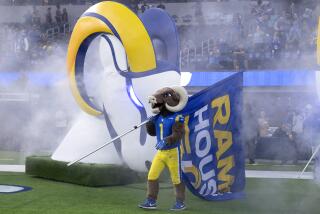Lighten Up on Enlightenment
- Share via
Some years back, my bosses tried to reduce common sense to a decree. The subject was workplace harassment. Their thinking was progressive. Employees shouldn’t have to endure come-ons and put-downs. Naturally, there was self-protection involved too. The Firm didn’t want to be party to lawsuits.
After this policy memo was circulated I assumed that vulnerable employees felt slightly more secure, having right officially on their side.
But I also detected a drop-off in what used to be known as compliments. As in, “That is a lovely outfit.” Or, “Blue is definitely your color.”
Here and there, a few people tried to make light of the trend. One editor and I began calling each other “honey” and “sweetie” by way of being witty. Generally, though, suspicions were heightened and distance was widened between those who did not know each other.
Maybe it was a more secure workplace, but it was also drearier.
The flaw was not the aim, it was the assumption. It boiled down to this: Harassment is anything that anyone says it is. That is, if you feel harassed, you are.
Which brings us to this matter of sports teams and their nicknames, in particular references to Indians such as Chiefs and Redskins.
Some earnest folks would impose the same standard to athletic mascots that business has tried to apply to workplace harassment: If someone or some segment of society is offended, then the nickname is offensive. You cannot argue the point without displaying insensitivity to someone’s sensitivity. The charge becomes proof of a crime.
Actually, there are so many things out of whack with organized sports in our culture that team logos hardly bear concern. But the power we leverage out of language in the name of social fairness is a bigger matter--and has been intertwined with team names for some time now.
In the latest flare-up, the California state Assembly defeated a bill that would have banned Indian mascots from public schools. But we all know that we haven’t heard the last of it. Once activists bear down on matters of symbolism, the stakes rise and people start to feel they cannot lose without losing big.
For the last 40 years or so, we have argued vigorously over the power of words in our culture, and the damage they inflict and the stereotypes they preserve. There is no question that oppression has been diminished and awareness heightened by those who police our language. Ours is a better society for the way we speak of each other now.
We are also a society wound very tight on these matters, too tight, actually. I don’t think we’d find ourselves backsliding on social progress if we agreed that part of enlightenment is the ability to relax too. We are in danger of draining away not just bigotry and offensiveness in our language but things worth celebrating. Whether it is a simple workplace compliment or a ballpark cheer for our mixed ancestry, maybe we could dare to trust our good sense now.
So let’s gripe about “Redskins.”
Here’s a word that in any context except football and apples is a pejorative, always has been. In the United States in the year 2002, surrendering the word would be a victory for our ideals.
On the other hand, “Chiefs” has far more going for it than against it. When I travel the West and interview Native American “chiefs,” I’m looking up, not down.
To the extent that sports mascots are to suggest strength, unity, leadership, perhaps even integrity, I can think of few words more apt than “chief.” Surely, it’s a metaphor as worthy as “the 49ers,” who were a rag-tag bunch of Gold Rush get-rich-quick schemers.
Yes, “chief” was once a commonplace term used by non- Indians to describe Indians. When I was in boot camp, all Indians were “chief.” Yet we shouldn’t forget that everybody was typecast and slurred as something. And “chief” carried less stigma than any of the epithets I recall.
“Words,” said the French writer Antoine de Saint-Exupery, “are the source of misunderstandings.” Fortunately, they are also the source of understanding.
Native American culture is part of our shared national heritage. Even accounting for all the grudges of history and the contemporary gaps in justice, there are things we can honor and celebrate, and sports happens to be an outlet for doing it.
I know--and, boy, do I--that it’s possible to offend without intending so. But I also know it’s possible to be offended when you shouldn’t be.


